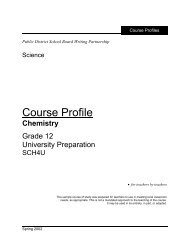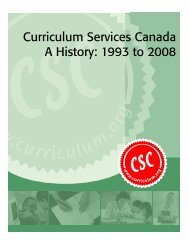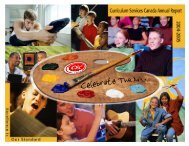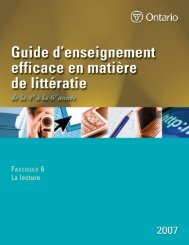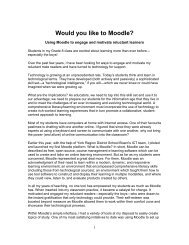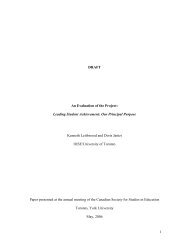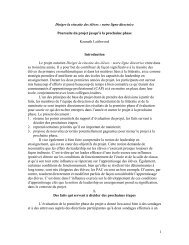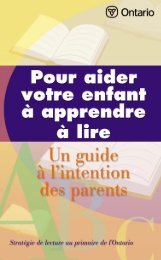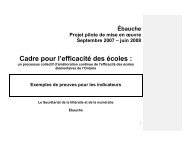Course Profile - Curriculum Services Canada
Course Profile - Curriculum Services Canada
Course Profile - Curriculum Services Canada
Create successful ePaper yourself
Turn your PDF publications into a flip-book with our unique Google optimized e-Paper software.
Accommodations<br />
• Allow students in pairs or small groups to work and discuss the issues in their first language, before<br />
recording their main ideas in English.<br />
• Some students may feel uncomfortable drawing and may use the computer to create their<br />
illustrations.<br />
• Readings may be altered to accommodate student needs.<br />
• An example of a visual representation of a philosophical argument may be shown and explained by<br />
the teacher. It would be beneficial to show an illustration of an argument that they have previously<br />
studied.<br />
Resources<br />
Blackburn, Simon. Think. Oxford: Oxford University Press, 1999.<br />
Miller, Ed L. Questions That Matter. New York: McGraw-Hill, 1996.<br />
Popkin, R. and A. Stroll. Philosophy Made Simple. New York: Doubleday, 1993.<br />
Thompson, Mel. Teach Yourself Philosophy. Chicago: NTC Publishing Group, 1995.<br />
Activity 5: Is a person a part of or separate from his/her environment?<br />
(Fallacies in Reasoning)<br />
Time: 225 minutes<br />
Description<br />
In this activity, students consider to what degree, if any, a person is a part of their environment or an<br />
entirely separate entity. While considering this issue, they are introduced to the terminology used to<br />
describe fallacies in reasoning. They are provided with the opportunity to identify and explain fallacies<br />
found in a philosophical article and in a newspaper article. This will be done in groups of four and then<br />
individually. Using a four corners exercise, students debate the question, “Is a person a part of or separate<br />
from their environment?” Once the debate has been completed, students prepare a visual representation<br />
of the relationship between themselves and their environment for their Philosopher’s Journal.<br />
Strand(s) & Learning Expectations<br />
Strand(s): Philosophical Questions, Research and Inquiry Skills<br />
Overall Expectations<br />
PQV.02 - summarize their own or others’ answers to these questions, and give reasons in support of the<br />
answers;<br />
ISV.02 - evaluate some main philosophical arguments.<br />
Specific Expectations<br />
PQ1.02 - give appropriate reasons for their own or others’ answers to three (or more) of the big questions<br />
of philosophy;<br />
IS1.04 - illustrate common fallacies in reasoning.<br />
Prior Knowledge & Skills<br />
Students have some previous experience evaluating philosophical arguments. This lesson provides<br />
students with terminology that they will utilize for the remainder of the course.<br />
Unit 1 - Page 14<br />
• Philosophy: The Big Questions - Open



